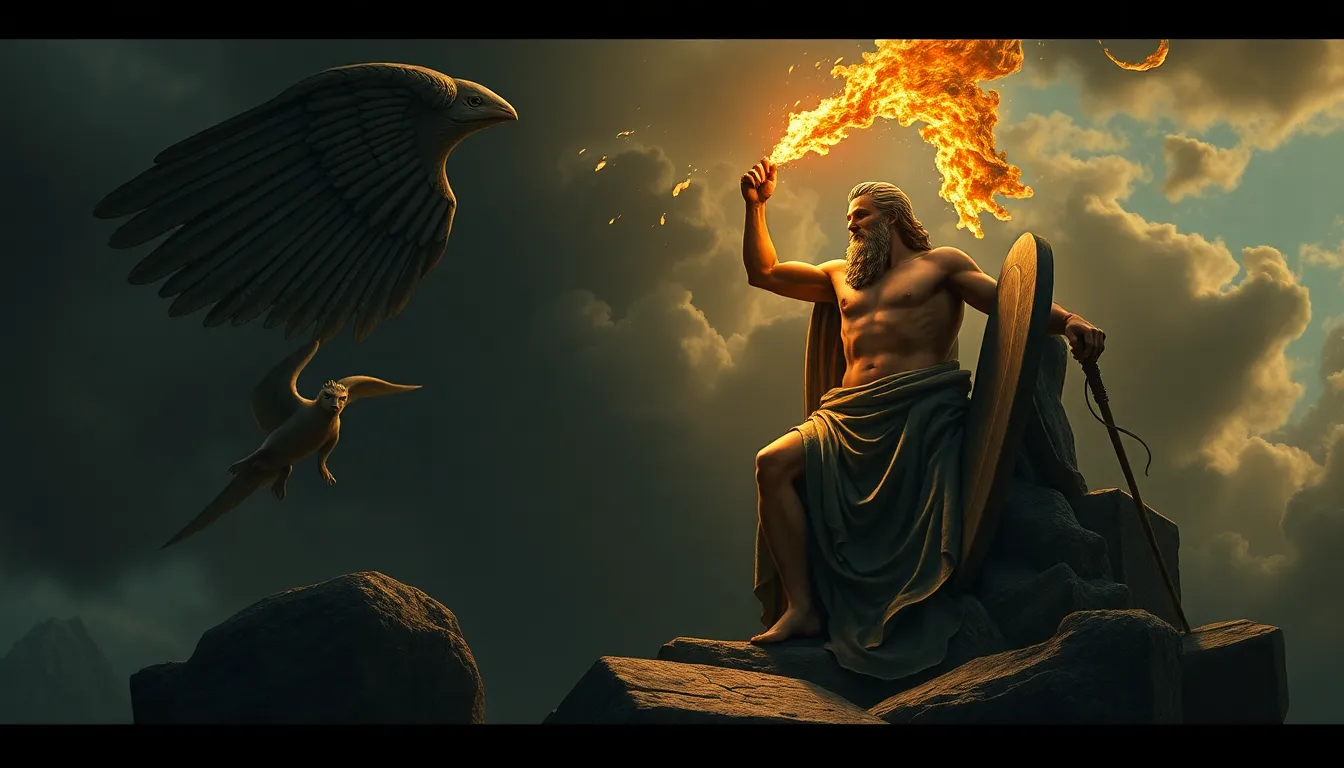The Tragic Heroism of Prometheus: Lessons from His Story
I. Introduction
A tragic hero is often defined as a character of noble stature who possesses a flaw or makes an error in judgment that ultimately leads to their downfall. In Greek mythology, Prometheus is one of the most compelling tragic heroes, embodying the themes of heroism and sacrifice through his actions and their consequences.
This article aims to explore the themes surrounding Prometheus’s story, delving into the complexities of heroism, the nature of sacrifice, and the enduring lessons that can be drawn from his myth.
II. The Myth of Prometheus
A. Summary of Prometheus’s story
Prometheus, a Titan, is credited with the creation of humanity from clay. His love for his creations drove him to defy the gods, particularly Zeus, to benefit mankind. The most significant act of defiance was his theft of fire from Olympus.
1. Creation of humanity
In various accounts, Prometheus breathes life into clay figures, shaping humans in the image of the gods. This act is not merely a creation but a profound statement of his commitment to humanity.
2. Theft of fire and its significance
By stealing fire, Prometheus provides humanity with the means to progress. Fire symbolizes knowledge, enlightenment, and civilization. Without it, humanity would remain in darkness, both literally and metaphorically.
B. The consequences of his actions
1. Punishment by Zeus
As retribution for his transgressions, Zeus condemns Prometheus to eternal torment. He is bound to a rock, where an eagle comes daily to eat his liver, which regenerates each night. This punishment underscores the severity of defying divine authority.
2. Symbolism of his eternal suffering
Prometheus’s suffering serves as a poignant reminder of the costs of heroism. His pain symbolizes the struggle for enlightenment and the sacrifices made for the betterment of humanity.
III. Characteristics of a Tragic Hero
A. Noble stature and greatness
Prometheus possesses noble qualities, acting out of love for humanity. His greatness lies in his willingness to challenge Zeus, a powerful figure, for the sake of human progress.
B. Flaw or error in judgment (hamartia)
His hamartia can be seen as his hubris—his belief that he could outwit Zeus and defy the divine order without facing dire consequences.
C. Downfall and its implications
Prometheus’s downfall is a powerful narrative of sacrifice and suffering. His punishment raises questions about the nature of authority and the price of defiance.
IV. The Nature of Sacrifice
A. Prometheus as a symbol of selflessness
In his quest to elevate humanity, Prometheus represents selflessness. He willingly endures suffering for the benefit of others, making him a quintessential hero.
B. The relationship between sacrifice and heroism
- True heroism often involves personal sacrifice.
- Prometheus’s actions highlight the link between heroism and the willingness to suffer for a greater good.
C. Modern examples of sacrifice inspired by Prometheus
In contemporary society, many individuals embody the spirit of Prometheus through their sacrifices, whether in social justice movements, humanitarian efforts, or scientific advancements aimed at improving lives.
V. The Role of Defiance and Resistance
A. Prometheus’s rebellion against divine authority
Prometheus’s rebellion serves as a lesson in courage. His defiance against Zeus illustrates the importance of standing up for what one believes in, especially when it concerns the welfare of others.
B. The importance of standing up for humanity
His actions remind us that resistance against oppressive forces can lead to progress, even at great personal cost.
C. Lessons in courage from Prometheus’s defiance
- Defiance can be a powerful catalyst for change.
- Standing up for others is a hallmark of true heroism.
VI. The Consequences of Knowledge
A. Fire as a metaphor for enlightenment and progress
The gift of fire represents knowledge and the potential for human advancement. It allows humanity to evolve, innovate, and thrive.
B. The duality of knowledge: empowerment vs. punishment
While knowledge empowers, it can also lead to suffering. Prometheus’s story warns of the potential consequences that come with enlightenment, reflecting the complex relationship between knowledge and responsibility.
C. Implications for contemporary society
In today’s world, the pursuit of knowledge often comes with ethical dilemmas. We must navigate the fine line between advancement and the potential repercussions of our actions.
VII. Prometheus in Modern Culture
A. Adaptations in literature, film, and art
The myth of Prometheus has inspired countless adaptations across various media, from Mary Shelley’s “Frankenstein” to modern films that explore themes of creation and rebellion.
B. The enduring legacy of Prometheus’s story
His story continues to resonate, serving as a metaphor for innovation and the relentless human spirit in the face of adversity.
C. How modern interpretations reflect current societal values
Contemporary interpretations often emphasize themes of social justice and the fight against oppression, aligning with Prometheus’s original defiance against tyranny.
VIII. Conclusion
Prometheus’s tragic heroism teaches us invaluable lessons about the nature of sacrifice, the importance of knowledge, and the necessity of defiance in the face of injustice. His story remains relevant in today’s world, urging us to embrace our own capacity for heroism and sacrifice.
As we reflect on the lessons learned from Prometheus, let us consider how we can embody these ideals in our own lives. By standing up for those in need and embracing the spirit of selflessness, we too can become modern-day Prometheans, lighting the way for future generations.




